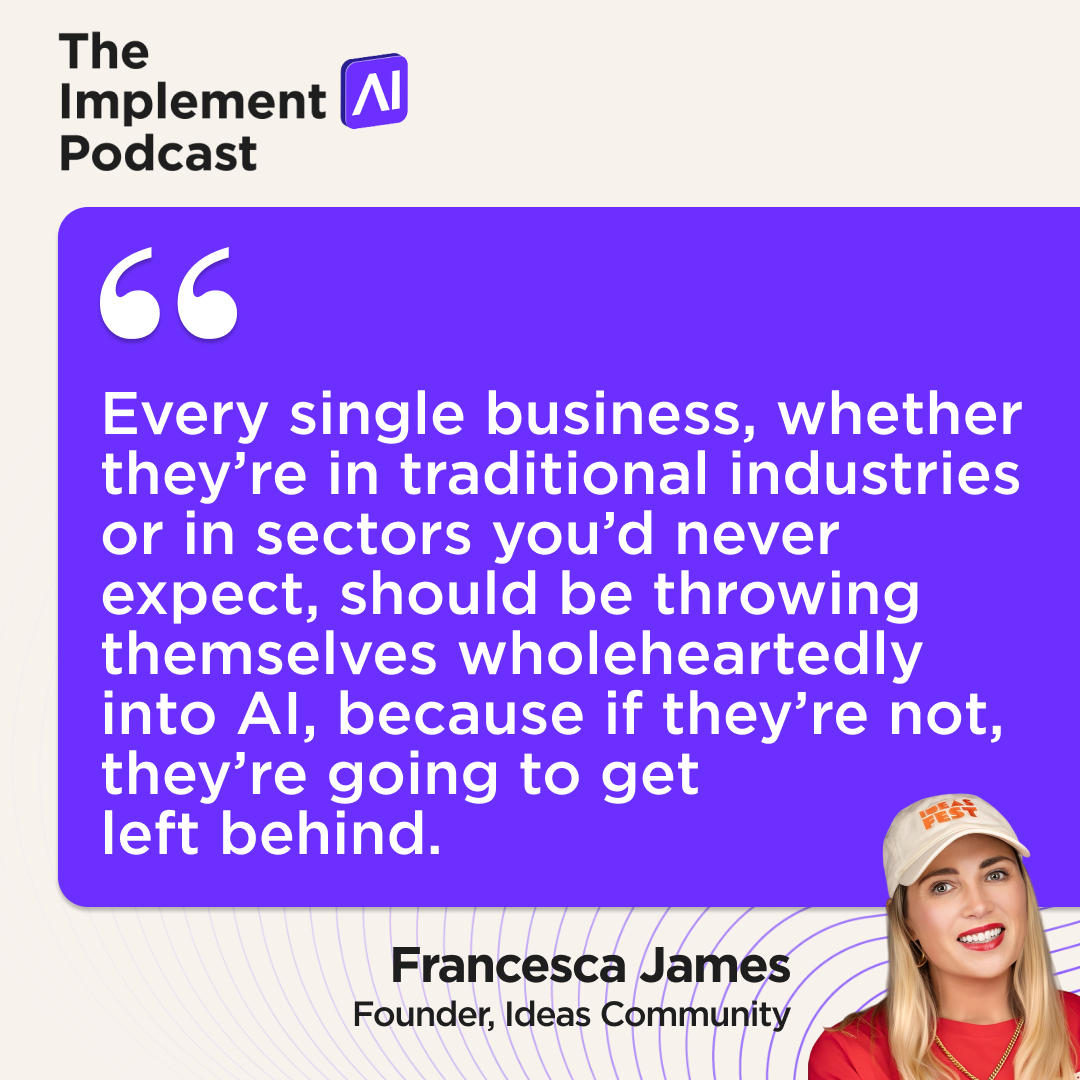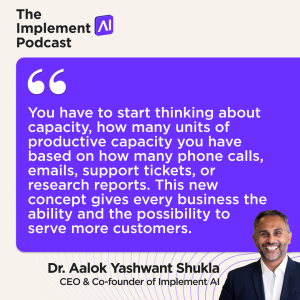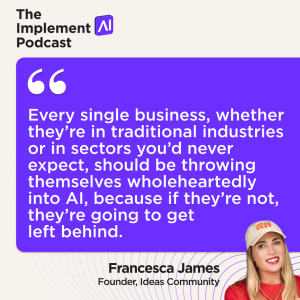The Implement AI Podcast #70 – Scaling Capacity: How Productive Capacity Units Are Rewriting the Rules of Growth
November 18, 2025
Every company wants to scale.
But most are still measuring growth in headcount and hours instead of capacity and compute.
In this new episode of The Implement AI Podcast, Piers Linney and Dr Aalok Y. Shukla introduce a model that reframes what productivity really means in the age of digital workers, Productive Capacity Units (PCUs).
They’re joined by Frankie James, founder of the Ideas Community, the Great British Entrepreneur Awards, and Ideas Fest, to explore how small teams can serve huge communities by combining human connection with intelligent automation.
This conversation explores a powerful question:
How can businesses in this digital age build capacity that compounds without losing their human heartbeat?
The Shift from People to Productive Capacity
For years, productivity meant Full-Time Equivalents (FTEs), how many people, how many hours, how much output.
But as Aalok explains, that model no longer reflects how modern work gets done:
“You have to start thinking about capacity, how many units of productive capacity you have based on how many phone calls, emails, support tickets, or research reports. This new concept gives every business the ability and the possibility to serve more customers.”
Each PCU represents a measurable output, one call handled, one analysis completed, one customer query resolved.
With this lens, leaders can finally measure the work their digital colleagues deliver alongside human teams.
Why This Matters
- PCUs create visibility into what digital workers actually achieve.
- Capacity becomes predictable as you can scale output, not just effort.
- Investment decisions become clearer, aligning technology spend with measurable productivity.
As Piers adds:
“Your capacity in your business is going to become a function of how much compute you’re actually using, whether it’s cognitive for knowledge work, or physical work in terms of robots.”
Capacity is now a function of compute power.
The businesses that understand this shift will scale faster, smarter, and with less friction.
The Hidden Cost of “Invisible Hours”
Frankie James leads a lean Cardiff-based team managing more than 100,000 entrepreneurs across the UK.
Her community spans founders, fast-growth companies, and established industry leaders.
Behind that scale lies a common constraint – time. “Time is absolutely without shadow of a doubt, the biggest currency.”
Every email, follow-up, application, and event touchpoint consumes hidden hours that could be automated or amplified.
This is where digital workers, measured through PCUs, become transformational. They reclaim the hours that go unseen, allowing teams to focus on connection, creativity, and community building.
The Power of Storytelling and Data
Frankie’s platforms, the Great British Entrepreneur Awards, UK StartUp Awards, and Ideas Fest, generate thousands of founder stories each year. Each one holds insights, lessons, and inspiration for others on the same path.
“We’re sitting on so many incredible stories. What we do is we showcase incredible role models and stories, not just the shiny bits, but the lessons where things have gone wrong on our stages and our events. There’s an opportunity to do that all year round and to create a real content engine.”
In the idea of turning stories into a systems, is where AI shines.
Through structured data and intelligent automation, communities like Frankie’s can scale the human experience, keeping engagement alive long after the event banners come down.
How to Build Capacity That Compounds
Aalok explains that the starting point is visibility.
You can’t scale what you don’t measure.
He suggests mapping every channel, phone calls, emails, reports, customer interactions, and defining what one PCU looks like in each. Once you know that, you can track output and efficiency in real time.
How to Begin
- Step 1: Identify your repeatable processes: outreach, customer support, onboarding, follow-up.
- Step 2: Define a single unit of value: one conversation, one ticket, one conversion.
- Step 3: Assign it a PCU and track it for both human and digital workers.
- Step 4: Scale the digital side, where capacity can multiply exponentially.
Small experiments compound fast. A few automated PCUs in sales or event management can reclaim hundreds of hours a month.
Capacity as a Competitive Edge
This episode closes on a reflection that ties every insight together.
Capacity is not just an operational advantage. It’s a new strategic currency.
Those who plan for it now will gain time, talent, and trust before others even start.
“Every single business, whether they’re in traditional industries or in sectors you’d never expect, should be throwing themselves wholeheartedly into AI, because if they’re not, they’re going to get left behind.” – Frankie James
Key Takeaways
- Measure in PCUs, not hours. Treat capacity as a quantifiable, scalable asset.
- Invest in digital workers. They extend human teams without adding cost or fatigue.
- Build visibility first. Map your processes before automating them.
- Scale storytelling. Use AI to turn data and stories into living content.
- Start small, compound fast. The first few PCUs often unlock the biggest returns.
Final Thoughts
Capacity is the real frontier of growth.
The organisations that learn to plan for it, with the right blend of people, data, and compute, will not only grow faster but build teams that can do more with less friction and more focus.
🎧 Listen to the full episode now:
Apple: https://bit.ly/3JqaGI2
Spotify: https://bit.ly/48QRSvW
YouTube: https://bit.ly/3WYMeAB






